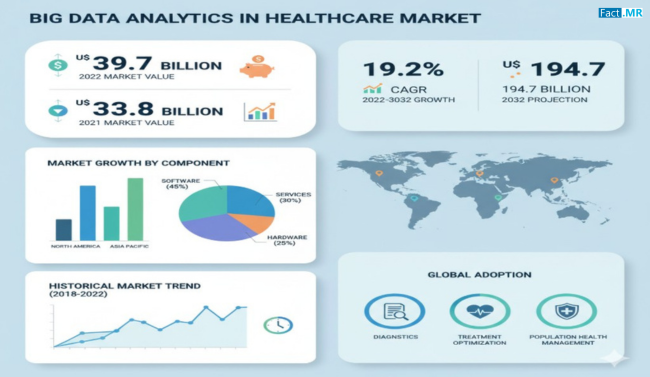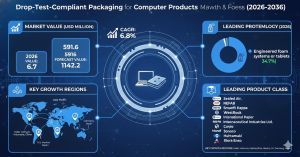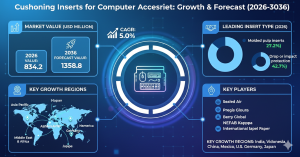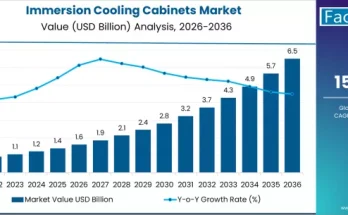Big data analytics is revolutionizing the healthcare sector by enabling providers, payers, and policymakers to harness vast amounts of medical and operational data. The growing adoption of electronic health records, biomedical data, and omics datasets is driving demand for analytics solutions that improve patient outcomes, enhance operational efficiency, and streamline decision-making processes. This trend highlights the critical role of data-driven insights in shaping the future of healthcare.
Market Overview:
Big data analytics in healthcare involves the collection, processing, and analysis of large, complex, and heterogeneous datasets. These datasets include patient medical histories, clinical trials, diagnostic imaging, genomic data, and real-time health monitoring information. Analytics solutions help healthcare organizations predict disease patterns, optimize resource allocation, manage costs, and prevent fraud. They also support personalized medicine by enabling tailored treatment plans based on individual patient profiles.
Regional Insights:
North America leads the adoption of big data analytics in healthcare, driven by advanced technological infrastructure, strong healthcare IT investments, and government initiatives promoting data sharing. Europe follows closely, with regulations emphasizing patient safety, data protection, and standardized healthcare protocols encouraging analytics adoption. Asia-Pacific is an emerging market due to rapid healthcare infrastructure expansion, rising adoption of digital technologies, and growing demand for efficient patient care in countries like Japan, China, and India.
Key Trends & Forecast:
- Integration of Predictive Analytics:Healthcare organizations are increasingly using predictive models to anticipate disease outbreaks, readmission risks, and treatment outcomes.
- Cloud-Based and On-Premises Deployment:Both deployment types are gaining traction, offering scalable solutions for diverse healthcare facilities.
- Fraud Detection and Security Enhancements:Analytics platforms are being employed to identify fraudulent insurance claims, prevent cyberattacks, and safeguard sensitive patient data.
- Policy and Decision Support:Governments and health agencies are leveraging big data for population health monitoring, resource planning, and evidence-based policy-making.
- Real-Time Monitoring:Hospitals and clinics are adopting real-time analytics to optimize operations, reduce waiting times, and improve patient satisfaction.
Applications & End-Use Outlook:
Big data analytics finds extensive applications across the healthcare ecosystem:
- Healthcare Providers:Hospitals, clinics, and laboratories use analytics to monitor patient outcomes, manage inventory, and optimize operational workflows.
- Healthcare Payers:Insurance companies leverage analytics for claims processing, fraud detection, risk assessment, and cost optimization.
- Pharmaceuticals & Research:Data-driven insights accelerate drug discovery, clinical trials, and the development of personalized therapies.
- Government and Public Health:Agencies use analytics for epidemiological studies, population health tracking, and pandemic preparedness.
The increasing complexity of healthcare operations, coupled with the growing availability of unstructured data, is expected to drive widespread adoption of analytics platforms across these applications.
Competitive Landscape:
The market features established technology providers and healthcare-focused analytics companies. Strategies include:
- Development of AI-powered predictive analytics solutions for clinical and operational use.
- Expansion of cloud-based platforms to enable scalable and flexible deployments.
- Strategic partnerships with hospitals, insurers, and research institutions to deliver customized solutions.
- Enhancing cybersecurity measures to protect sensitive health data while maintaining compliance with privacy regulations.
Key players include IBM Corporation, Microsoft Corp., OptumHealth Care Solutions, Oracle Corp., SAS Institute, Allscripts Healthcare Solutions, Verisk Analytics, Cisco Systems, Infosys, and SAP SE.
Key Takeaways of the Report:
- Predictive analytics is transforming patient care by enabling early intervention and personalized treatment.
- Cloud-based and on-premises deployment models provide flexibility and scalability for healthcare organizations.
- Analytics platforms enhance fraud prevention, reduce operational inefficiencies, and improve claims processing.
- Asia-Pacific is emerging as a high-growth region due to expanding healthcare infrastructure and digitization efforts.
- Data privacy and cybersecurity remain critical considerations influencing technology adoption.
Market Drivers and Key Trends:
The adoption of big data analytics is driven by the need for enhanced patient outcomes, operational efficiency, and regulatory compliance. Rising healthcare costs, the increasing prevalence of chronic diseases, and demand for personalized medicine are further encouraging the implementation of analytics solutions. Governments and healthcare organizations are also investing in data infrastructure to facilitate secure and effective use of healthcare data.
Company Profile:
Market leaders are innovating by integrating AI and machine learning capabilities into analytics platforms, developing predictive and prescriptive insights for clinical and operational decision-making. Start-ups focus on niche solutions, such as population health analytics, real-time monitoring, and specialized fraud detection tools. Providers are also emphasizing cybersecurity, compliance, and scalable cloud solutions to meet the growing demand for secure, efficient, and data-driven healthcare services.
Conclusion:
The big data analytics in healthcare market is poised for significant growth as healthcare organizations increasingly leverage data-driven insights to improve patient care, reduce costs, and optimize operations. With advancements in predictive analytics, real-time monitoring, and AI integration, healthcare providers, payers, and policymakers can make informed decisions that enhance outcomes and operational efficiency. Adoption of comprehensive analytics solutions will continue to play a pivotal role in shaping the future of healthcare delivery globally.
Browse Full Report – https://www.factmr.com/report/369/big-data-analytics-healthcare-market



